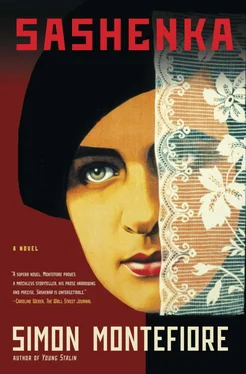“She’s become…beautiful again,” Sashenka whispered. “Yet there’s no one there.” Sure enough, Ariadna was no longer the quivering ruin but as beautiful as she had been as a girl. She was serene, her skin white, her pretty nose upturned, and those lush lips slightly opened as if expecting to be kissed by some dashing young officer.
This is how I’ll remember her, thought Sashenka. What a beauty. Yet she felt a gnawing dissatisfaction and uneasiness: she had never known her. Her mother had been a stranger.
And who was she herself in this play? She no longer belonged there. While her mother was dying, she had become her daughter again. Her father, who had been unfazed by revolutions, wars, strikes and abdications, by his daughter’s arrest, his brother’s mischief, his wife’s affairs, who had defied Petrograd workers, Baku assassins and aristocratic anti-Semites, had crumpled under this, a domestic suicide. He had abandoned his business, left his contracts unsigned, his contacts neglected and, in a few weeks, he had lost almost all interest in money. The businesses in Baku, Odessa and Tiflis were already unraveling because the Azeri Turks, Ukrainians and Georgians were liberating themselves from the Russian Empire. But the details were in his mind, and it seemed that this unshaven, grief-stricken man was beset by doubts about everything. She could hear him jabbering and crying.
It seemed to Sashenka that she might be losing both parents in one day.
She did not cry anymore—she had cried often enough in recent nights—but still she longed to know why her mother had used her daughter’s gun. Was Ariadna punishing Sashenka? Or was it simply the first weapon that had come to hand?
Sashenka stood beside the bed for a long time as people came and went to pay their respects. Gideon staggered into the room and kissed Ariadna’s forehead. He ordered the doctor to sedate her father. The old Jews prayed. She watched as Turbin reclaimed the wicked she-devil of St. Petersburg.
Ariadna’s smile remained, but gradually her face started to subside. Her cheeks sank, and her gentile nose, the perfect little button that had allowed her to romance Guards officers and English noblemen, became Semitic and hooked. Sashenka’s grandfather covered the body with a white shroud and lit two candles in silver candlesticks at the head of the bed. Miriam covered the mirrors with cloths and opened the windows. Since Zeitlin himself seemed paralyzed, the rabbi took control. Orthodox Jews, liberated by the Revolution and allowed to visit the capital, appeared in this most secular of houses, as if by magic. Low stools were provided for the women to sit shiva.
There was a debate among the rabbis about what to do with the body. A suicide was beyond God’s law and should have consigned her to an unholy burial, another tragedy for Ariadna’s father. But two other rabbis had arrived and they asked what had actually killed Ariadna. An infection, Dr. Gemp replied, not a bullet. By this pragmatic and merciful device, the Rabbi of Turbin was allowed to bury his daughter Finkel, known as Ariadna, in the Jewish cemetery.
Finally, the servants, shocked and confused by the presence of these gabardine-coated Jews with ringlets and black hats, filed past the bed.
Sashenka knew she had to get back to her job at the Bolshevik newspaper. As if on cue, the door opened and Mendel, who had appeared only once for ten minutes a few days after the shooting, limped into the room between two young comrades, the powerful, thickset Vanya Palitsyn, now clad in a leather coat and boots with a pistol in his holster, and the slim, virile Georgian, Satinov, who wore a sailor’s jacket and boots. They brought the welcome breath of a new age into the chamber of decay.
Mendel was wearing a long lambskin coat and a worker’s cap. He approached the bed, looked coldly at his sister’s face for a moment, shook his head and then nodded at his sobbing parents.
“Mama, Papa!” he said, in his deep voice. “I’m sorry.”
“Is that all you have to say to us?” asked Miriam through a curtain of tears. “Mendel?”
“You’ve wasted enough time here, Comrade Zeitlin,” Mendel said brusquely to Sashenka. “Comrade Lenin arrived last night at the Finland Station. I’ve got a job for you. Get your things. Let’s go.”
“Wait, Comrade Mendel,” said Vanya Palitsyn quietly. “She’s lost a mother. Let her take her time.”
Mendel stopped. “We’ve work to do and Bolsheviks can’t and shouldn’t have families. But if you say so…” He hesitated, looking back at his parents and the deathbed. “I lost a sister too.”
“I’ll bring Comrade Snowfox,” said Vanya Palitsyn. “You two go ahead.”
Satinov kissed Sashenka thrice and hugged her—he was a Georgian after all, she remembered. “You mourn all you need,” said Satinov, following Mendel as he limped out.
Vanya Palitsyn, brawny in his leathers and holster, looked out of place in the exquisite boudoir, yet Sashenka appreciated his support. She saw his brown eyes scan the room and imagined what the peasant-worker would make of the decadent trappings of capitalism: of all those dresses and jewels, Zeitlin the prostrate, sobbing industrialist, the society doctor in his cape, the half-soused bon viveur Gideon, the tearful servants and the rabbi. Vanya could not take his eyes off those wailing Jews from Poland!
Sashenka was pleased to be able to smile at something.
“I’ve read about deathbeds in Chekhov stories,” she said quietly to him, “but I never realized they’re so theatrical. Everyone has a role to play.”
Vanya just nodded, then he patted Sashenka on the shoulder. “Don’t rush, comrade,” he whispered. “We’ll wait. Cry all you need. Then go and get cleaned up, little fox,” said Vanya, his tenderness all the more touching in one so big. “You’ll come back for the funeral but for now I’ve got a motorcar outside. I’m taking you to the mansion. I’ll wait for you downstairs.”
Sashenka took in the room and the family in a last sweeping glance of farewell. She approached the bed and kissed her mother’s forehead. She was crying again and she noticed tears in Vanya’s eyes too.
“Vanya, wait. I’m coming right now,” said Sashenka, her voice breaking as she backed out of the room.
At midday the next day, in the silk-walled splendor of the Modernist Kschessinskaya Mansion, where once the ballerina Mathilde had entertained both her Romanov lovers, Sashenka sat at an Underwood typewriter at a neat wooden desk on the first floor. She wore a white blouse, buttoned to the neck, a long brown woollen skirt and sensible laced-up ankle boots. She was not alone in the anteroom. Three other girls, two of them wearing round spectacles, also sat at desks, pivoting round to watch the door.
The mansion was manned by armed Red Guards, actually workers who wore parts of different uniforms, commanded by Vanya himself. Vanya had taken her out for a quick meal the night before and driven her home afterward. In the morning she had visited, for the first and last time, the Moorish-style synagogue on Lermontovskaya (which her father had paid for) and then seen her mother buried in the Jewish cemetery, where she, her father and Uncle Gideon seemed drowned in the sea of mourning Jews in their wide hats and coats, attired entirely in black, except for the white fringes of their prayer shawls.
Vanya had begged her to take another day off but she replied that her mother had already consumed too many days of her life, and she’d hurried back to her new office—to meet her new boss. How could a young person wish to be anywhere else in the world but here in the ballerina’s mansion, the furnace of revolution, the cynosure of history?
At her desk, Sashenka heard the buzz of excitement from downstairs. The meeting in the ballroom, attended by all the Central Committee, was about to break up. Just then its doors opened, the sounds of laughter and voices and the tread of boots on the stairs coming closer.
Читать дальше












